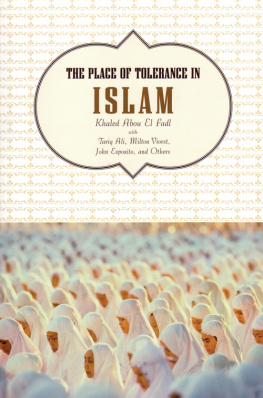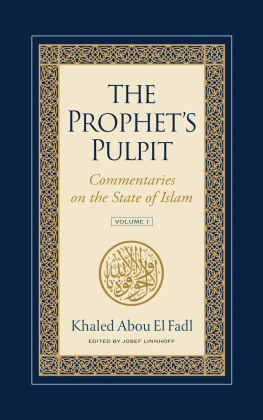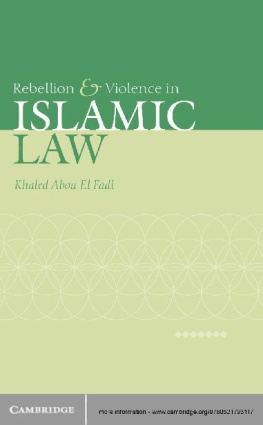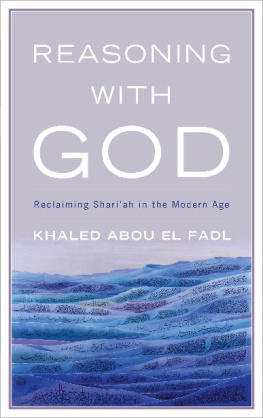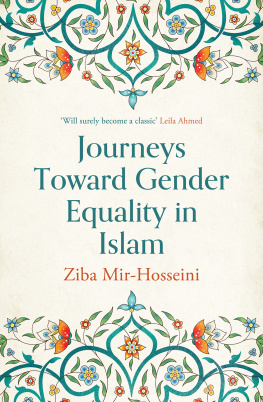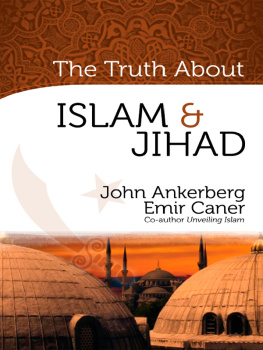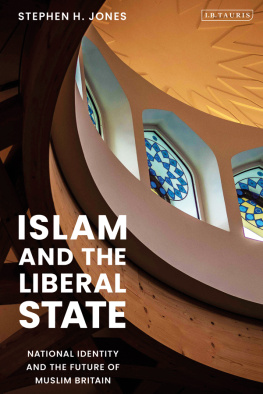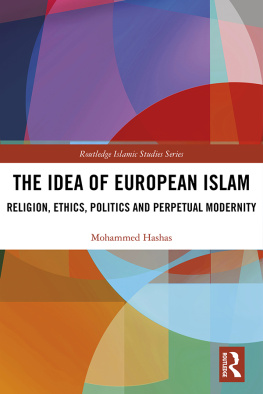CONTENTS
KHALED ABOU EL FADL
The Place of Tolerance in Islam
MILTON VIORST
Puritanism and Stagnation
SOHAIL H. HASHMI
A Conservative Legacy
TARIQ ALI
Theological Distractions
ABID ULLAH JAN
The Limits of Tolerance
STANLEY KURTZ
Text and Context
AMINA WADUD
Beyond Interpretation
AKEEL BILGRAMI
The Importance of Democracy
MASHHOOD RIZVI
Intolerable Injustices
JOHN L. ESPOSITO
Struggle in Islam
QAMAR-UL HUDA
Plural Traditions
R. SCOTT APPLEBY
The Quandary of Leadership
KHALED ABOU EL FADL
Reply
EDITORS PREFACE
JOSHUA COHEN AND IAN LAGUE
Since September 11, Western discussions of Islam have typically been conducted through a contest of caricatures. Some analysts present Islamic extremism as a product of a clash of civilizations that pits Eastern despotism against Western individualism. Others see such extremism as a grim blowback of Americas cold-war foreign policy. Engagement with Muslim faith commonly takes the form of simplistic pronouncements about essence of Islam: Osama bin Laden either represents the true message of the Prophet or corrupts a religion of peace.
As Khaled Abou El Fadl points out, these discussions are driven more by Western concernsare Muslims dangerous or not?than by a serious effort to understand Islam and the place of toleration and moral decency in its conception of a proper human life. In his lead essay for this volume, Abou El Fadl opens such a conversation. A professor at UCLA, theorist of Islamic law, and prominent critic of Islamic puritanism, Abou El Fadl works to reclaim the moral trust of Islam by recovering the Qurans universal principles from the historical and social context in which the text was received. He interprets Quranic verses about the treatment of women and non-Muslims in light of scriptural passages that call for mercy, kindness, and justice, and that emphasize the essentially plural nature of the human community.
Abou El Fadls engagement with these theological issues is enriched by a broad historical perspective. He points out that intolerant sects have traditionally been marginalized by Islamic civilization. But Islam, he argues, currently faces a crisis of religious authority owing to the political exploitation of Islamic symbols and the stagnation of civic and economic life in Muslim societies. That crisis has facilitated the rise of puritanical sects who interpret the Quran literally and ahistorically. Abou El Fadl acknowledges that the Quran itself, like other ancient religious texts, cannot forestall such interpretations: interpretation is an act for which readers must take moral responsibility. In the end, religious texts provide rich possibilities for meaning, not inevitabilities, so the text will morally enrich the reader, but only if the reader will morally enrich the text.
While a majority of respondents accept Abou El Fadls critique of Islamic puritanism, they take issue with this general conception of the debate and with his specific arguments. Some respondents contend that Abou El Fadls brand of Islam will only appeal to Westerners and students in liberal divinity schools and that religious dialogue in the Muslim world will be useless unless it is accompanied by dramatic social and political reform. Other respondents argue that theological debates are irrelevant and that the focus should be on the Western sabotage of such reforms. A different group of respondents criticizes these same policies as part of an exploitative program of Western secularization, and argues that calls for Islamic tolerance betray the Quranic injunction for Muslims to struggle against their oppressors.
These disagreements demonstrate that a discussion of tolerance in Islam cannot take place in isolation from debates about the distribution of political power and economic resources. But they also underscore the enduring challenge posed by religious morality in a pluralistic age: how can we retain the richness and intensity of conviction provided by a religious outlook while participating in what Abou El Fadl calls a collective enterprise of goodness that cuts across confessional differences?
1
THE PLACE OF TOLERANCE
IN ISLAM
KHALED ABOU EL FADL
The terrorist attacks on New York City and the Pentagon have focused public attention on the state of Muslim theology. For most Americans, the utter indifference to the value of human life and the unmitigated hostility to the United States shown by some Muslims came as a great shock. Others were confirmed in their belief that we face a great struggle between civilizations. Islamic values, they say, are fundamentally at odds with Western liberal values. The terrorist attacks are symptomatic of a clash between Judeo-Christian civilization, with its values of individual freedom, pluralism, and secularism, and an amoral, un-Westernized, so-called authentic Islam. Indeed, Islamic civilization is associated with the ideas of collective rights, individual duties, legalism, despotism, and intolerance that we associated with our former civilizational rival, the Soviet bloc. We seem to project onto the other everything we like to think that we are not.
This intellectual trap is easy to fall into when we deal with the theology of Osama bin Laden, the Taliban, the Wahhabis of Saudi Arabia, and the Jihad organization. The theologically based attitudes of these Muslim puritans are fundamentally at odds not only with a Western way of life but also with the very idea of an international society or the notion of universal human values. They display an intolerant exclusiveness and a belligerent supremacy vis--vis the other. According to their theologies, Islam is the only way of life, and must be pursued regardless of its impact on the rights and well-being of others. The straight path (al-sirat al-mustaqim) is fixed, they say, by a system of divine laws (sharia) that trump any moral considerations or ethical values that are not fully codified in the law. God is manifested through a set of determinate legal commands that specify the right way to act in virtually all circumstances. The sole purpose of human life on earth is to realize the divine manifestation by dutifully and faithfully implementing Gods law. Morality itself begins and ends in the mechanics and technicalities of Islamic law (though different schools of Islamic law understand the content of those laws differently).
A life devoted to compliance with this legal code is considered inherently superior to all others, and the followers of any other way are considered either infidels (kuffar), hypocrites (munafiqun), or iniquitous (fasiqun). Anchored in the security and assuredness of a determinable law, it becomes fairly easy to differentiate between the rightly-guided and the misguided. The rightly-guided obey the law; the misguided either deny, attempt to dilute, or argue about the law. Naturally, the rightly-guided are superior because they have God on their side. The Muslim puritans imagine that Gods perfection and immutability are fully attainable on earthas if Gods perfection had been deposited in the divine law, and, by giving effect to this law, we could create a social order that mirrors divine truth. By attaching themselves to the Supreme Being, puritan groups are able to claim a self-righteous perfectionism that easily slips into a pretense of supremacy.

